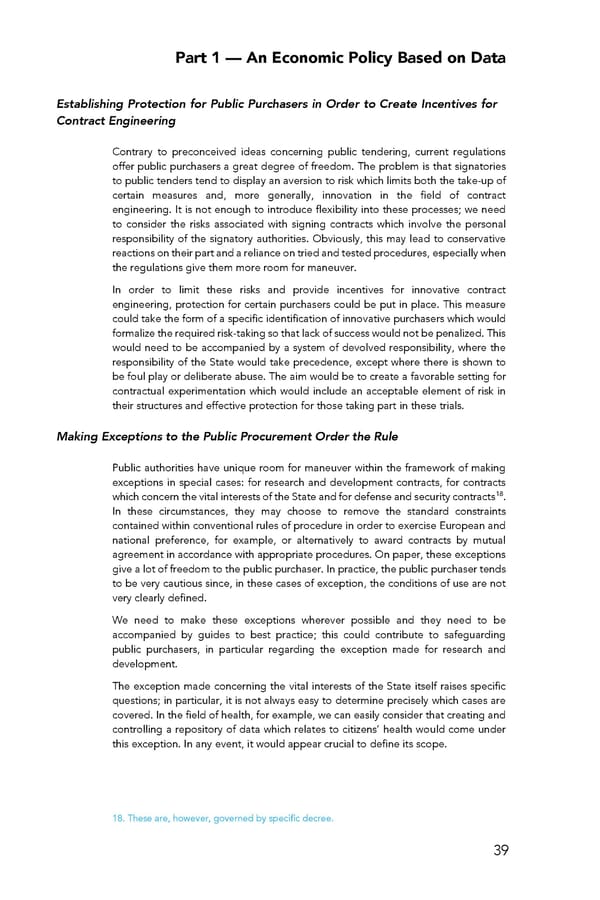Part 1 — An Economic Policy Based on Data Establishing Protection for Public Purchasers in Order to Create Incentives for Contract Engineering Contrary to preconceived ideas concerning public tendering, current regulations offer public purchasers a great degree of freedom. The problem is that signatories to public tenders tend to display an aversion to risk which limits both the take-up of certain measures and, more generally, innovation in the field of contract engineering. It is not enough to introduce flexibility into these processes; we need to consider the risks associated with signing contracts which involve the personal responsibility of the signatory authorities. Obviously, this may lead to conservative reactions on their part and a reliance on tried and tested procedures, especially when the regulations give them more room for maneuver. In order to limit these risks and provide incentives for innovative contract engineering, protection for certain purchasers could be put in place. This measure could take the form of a specific identification of innovative purchasers which would formalize the required risk-taking so that lack of success would not be penalized. This would need to be accompanied by a system of devolved responsibility, where the responsibility of the State would take precedence, except where there is shown to be foul play or deliberate abuse. The aim would be to create a favorable setting for contractual experimentation which would include an acceptable element of risk in their structures and effective protection for those taking part in these trials. Making Exceptions to the Public Procurement Order the Rule Public authorities have unique room for maneuver within the framework of making exceptions in special cases: for research and development contracts, for contracts which concern the vital interests of the State and for defense and security contracts18. In these circumstances, they may choose to remove the standard constraints contained within conventional rules of procedure in order to exercise European and national preference, for example, or alternatively to award contracts by mutual agreement in accordance with appropriate procedures. On paper, these exceptions give a lot of freedom to the public purchaser. In practice, the public purchaser tends to be very cautious since, in these cases of exception, the conditions of use are not very clearly defined. We need to make these exceptions wherever possible and they need to be accompanied by guides to best practice; this could contribute to safeguarding public purchasers, in particular regarding the exception made for research and development. The exception made concerning the vital interests of the State itself raises specific questions; in particular, it is not always easy to determine precisely which cases are covered. In the field of health, for example, we can easily consider that creating and controlling a repository of data which relates to citizens’ health would come under this exception. In any event, it would appear crucial to define its scope. 18. These are, however, governed by specific decree. 39
 For a Meaningful AI - Report Page 39 Page 41
For a Meaningful AI - Report Page 39 Page 41